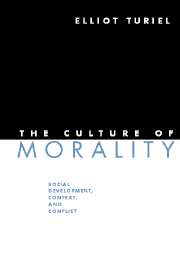Book contents
- Frontmatter
- Contents
- Preface
- 1 Introduction
- 2 Striving for Community
- 3 Discontents Revisited
- 4 Social Judgments and Social Contexts
- 5 The Development of Moral and Social Judgments
- 6 Social Thought and Social Action
- 7 Social Harmony and Social Conflict
- 8 Justice, Heterogeneity, and Cultural Practices
- 9 Social Hierarchy, Subordination, and Human Capabilities
- 10 Perspectives on Cultural Practices: More Than One
- 11 Subversion in Everyday Life
- 12 Conclusion
- References
- Index
6 - Social Thought and Social Action
Published online by Cambridge University Press: 05 June 2012
- Frontmatter
- Contents
- Preface
- 1 Introduction
- 2 Striving for Community
- 3 Discontents Revisited
- 4 Social Judgments and Social Contexts
- 5 The Development of Moral and Social Judgments
- 6 Social Thought and Social Action
- 7 Social Harmony and Social Conflict
- 8 Justice, Heterogeneity, and Cultural Practices
- 9 Social Hierarchy, Subordination, and Human Capabilities
- 10 Perspectives on Cultural Practices: More Than One
- 11 Subversion in Everyday Life
- 12 Conclusion
- References
- Index
Summary
Much of the research on morality and the other social judgments that I have discussed tells us about the judgments of children, adolescents, and adults. Some might argue that this does not tell us much of importance to what really counts – which is how people act. It might be said that it is actions and not moral judgments that ultimately make a difference for people and societies. One version of this argument is that people espouse moral values or articulate good moral arguments, but then often act in self-interested ways. Another version of this argument is implicit in Putnam's analyses of social capital. For Putnam, it is the activity of people getting together that is of importance for the well-being of society. Because of this orientation to actions, Putnam discounted the value of increased memberships in, for example, environmental and political watchdog groups. I argued, in contrast, that people's judgments and evaluations of group activities must be taken into account in efforts at understanding levels of social or civic participation. In that case, stepping back from participation in some groups may reflect moral judgments about the goals and activities of those groups. As I proposed, large memberships in environmental and political groups that mainly involve support through financial contributions may reflect moral concerns that led people to step back from some group activities. Similarly, conflictful activities, such as seen in protests and demonstrations, are often motivated by moral concerns and aimed at achieving social justice.
- Type
- Chapter
- Information
- The Culture of MoralitySocial Development, Context, and Conflict, pp. 119 - 151Publisher: Cambridge University PressPrint publication year: 2002
- 1
- Cited by



